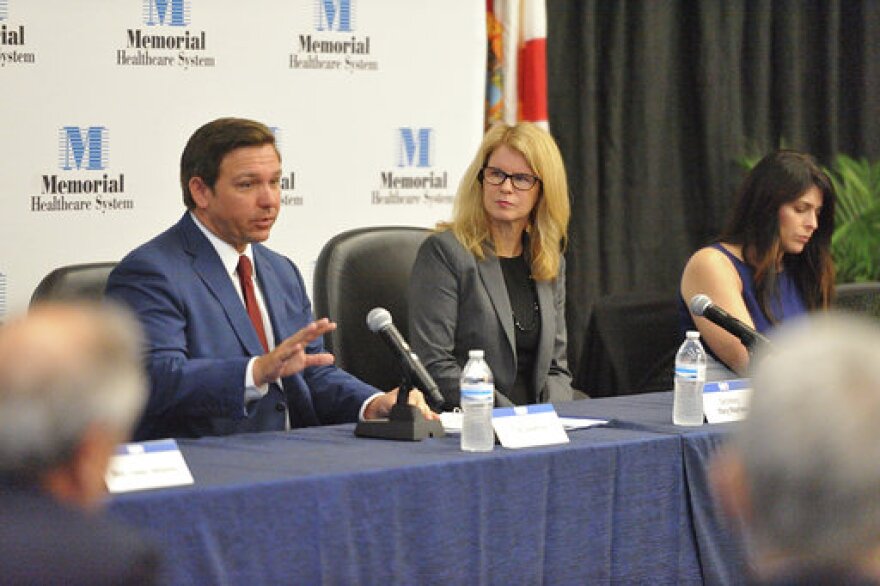Another year, another round of promises that health care costs could be contained if consumers across Florida just had more information. The question that remains is whether it will work.
More than half-dozen “transparency” bills have been filed in the Legislature, with lawmakers eager to use them to hold down health costs.
But the push for the legislation comes as existing transparency initiatives, backed by the promises of millions of dollars in state funding, have foundered. And some of the efforts to lower costs of care, critics warn, could actually have the opposite effect.
Gov. Ron DeSantis said this week that he’s “ordered us to get going” on a statewide health price-transparency website that was created by former Gov. Rick Scott.
Florida signed a $6.1 million contract with the Health Care Cost Institute to develop the FloridaHealthPriceFinder website, but the effort has been hampered by the state’s inability to collect claims data from several Florida HMOs and insurance companies. The result has been a website that hasn’t attracted much use, getting 42,779 hits since it was launched in November 2017. The highest number of hits in any month since it was launched was 3,968 in October.
“At the end of the day, I came in, not much had really been done or enough had been done,” DeSantis said.
He referred to the Florida HealthPriceFinder website in his State of the State address, which he delivered to the Legislature on Tuesday, the opening day of the 2019 session. DeSantis said he has instructed Agency for Health Care Administration Secretary Mary Mayhew to “expedite” things.
Florida HealthPriceFinder isn’t the only existing transparency initiative that the DeSantis administration is tracking. For example, the state has what is known as the “shared savings” initiative for the state employee health-insurance program.
In Broward County last month, DeSantis said he was ordering the Department of Management Services, which administers the employee-insurance program, to advertise the initiative and to “get as many people plugged into that as possible.”
The department signed contracts with two vendors as part of the shared savings initiative: a $3.6 million contract with Healthcare Bluebook, of which $700,000 has been paid, and a $4.2 million contract with Employer Direct Healthcare, of which about $113,000 has been paid.
The initiative allows state employees to go to either vendor and shop to see if incentives are offered on health care services they might need. State employees receive rewards after the services have been delivered and the claims paid.
The program became available to state employees on Jan. 1. Department of Management Services spokesman McKinley Lewis said that as of Thursday, rewards totaling $125 had been awarded to two state employees.
DeSantis would like to see a similar program offered in the regular commercial insurance market.
Meanwhile, a House panel on Thursday approved a proposal (HB 999), filed by Rep. Jackie Toledo, R-Tampa, that targets hospitals, which are ground zero for House Speaker Jose Oliva’s war on health costs.
The legislation would require hospitals to provide every patient a pre-treatment estimate of the costs of care. Furthermore, the bill would limit hospitals from exceeding the estimate by more than 10 percent.
Hospitals already are required to offer patients a cost estimate, but they only do it when asked, and right now patients aren’t requesting estimates, according to state officials.
David Ashburn, a Greenberg Traurig attorney who represents the Florida Hospital Association, told lawmakers the practical effects of Toledo’s legislation would actually increase health costs because hospitals would be asked to “staff up to provide an estimate in every case for every patient.”
Moreover, Ashburn said hospitals would be required to provide an estimate for each recommended course of treatment for a patient.
“You may have multiple estimates that are continually provided throughout the stay. Our concern is that the administrative burden associated with requiring this in all circumstances could be vast,” he said.
The bill cleared the panel by a 15-1 vote.
Toledo told The News Service of Florida after the meeting that estimates will be good for consumers and help foster a more competitive market.
“I think if it raises costs, it will raise it insignificantly,” she said.

